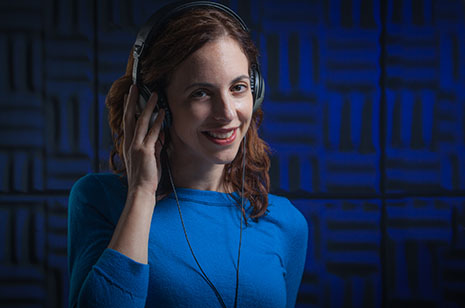Ability to Perceive Perfect Pitch Is More Common Than Previously Thought
FAYETTEVILLE, Ark. — New research finds that perception of absolute pitch in music is far more common that previously thought, challenging conventional wisdom that the ability to detect perfect pitch is rare.
University of Arkansas music professor Elizabeth Margulis and two colleagues at Tel Aviv University in Israel published their findings this month in the journal Music Perception.
A classic study in music psychology established that most people make sense of music in terms of relative pitch, or where notes are placed in relation to a central note. The corollary notion has been that only a few people – one in 10,000 – can access absolute pitch.
Margulis and her team, however, found that absolute pitch perception is far more common than previously believed, particularly in people without formal musical training. A secondary finding points to the possibility that this cognitive capacity to track absolute pitch and key impacts the emotional experience of listening to music.
The paper, “Implicit Absolute Pitch Representation Affects Basic Tonal Perception,” draws on research conducted by Margulis and Zohar Eitan in 2014, when Eitan spent a semester at the U of A as a visiting scholar. Moshe Shay Ben-Haim in Tel Aviv also worked on the paper.
Researchers extended the Krumhansl probe tone method, which asks people to rate how well individual notes fit within the context of a set of scales or chord series they have just heard. The results are predictable, with people rating in-key notes higher than notes not found in that series.
But when people were given two very different musical contexts – G major, which uses mainly white keys on a piano, and D-flat major, which uses mainly black keys and is less common in Western music – that predictability changed. People rated the in-key notes in G-major higher than the in-key notes in D-flat major, meaning their perceptions were influenced by their familiarity with the specific notes.
That demonstrates that they were responding not just to relative pitch, as commonly assumed, but also to absolute pitch, Margulis said.
“The way we implemented the probe tone test, we were able to show that the rules are not the same for all the keys,” she said. “That means that people have some kind of representation of absolute pitch, even when they don’t think they know anything about music. They’re not special ‘one-in-10,000’ absolute pitch holders, and they’re not Mozart.”
“Our challenge now is finding the right tools to draw that out implicitly and show what they’ve got in their brains that they’re not able to report explicitly,” Margulis said.
In a separate study reported in the same paper, researchers added another innovation, asking people to rate the tension they heard in the music. Tension is often related to the emotional aspect of the listening experience. Tension ratings tended to relate inversely to the goodness-of-fit ratings, which makes sense: the less well a note fits the context, the tenser it sounds. But people also thought the music sounded tenser when it was in the less common key.
Again, this shows that people are tracking notes in terms of absolute pitch and applying a cognitive dimension to their affective listening experience, whether they know it or not.
“There’s an imprint of this absolute pitch representation we don’t even know we have, but it’s actually shaping these expressive dimensions of music, and how tense the music seems,” Margulis said. “We’re trying to understand, why does some music move us, and others not? Here, we’re arguing that one tiny player in that big question is actually absolute pitch, and whether we’re hearing pitches that are more common in the environment to which we’re typically exposed, or whether we’re hearing rare pitches or keys.”
About the University of Arkansas: The University of Arkansas provides an internationally competitive education for undergraduate and graduate students in more than 200 academic programs. The university contributes new knowledge, economic development, basic and applied research, and creative activity while also providing service to academic and professional disciplines. The Carnegie Foundation classifies the University of Arkansas among only 2 percent of universities in America that have the highest level of research activity. U.S. News & World Report ranks the University of Arkansas among its top American public research universities. Founded in 1871, the University of Arkansas comprises 10 colleges and schools and maintains a low student-to-faculty ratio that promotes personal attention and close mentoring.
Contacts
Elizabeth Margulis, professor and director
Music Cognition Lab
479-575-5763,
ehm@uark.edu
Bettina Lehovec, staff writer
University Relations
479-575-7422,
blehovec@uark.edu
Headlines
PetSmart CEO J.K. Symancyk to Speak at Walton College Commencement
J.K. Symancyk is an alumnus of the Sam M. Walton College of Business and serves on the Dean’s Executive Advisory Board.
Faulkner Center, Arkansas PBS Partner to Screen Documentary 'Gospel'
The Faulkner Performing Arts Center will host a screening of Gospel, a documentary exploring the origin of Black spirituality through sermon and song, in partnership with Arkansas PBS at 7:30 p.m. Thursday, May 2.
UAPD Officers Mills and Edwards Honored With New Roles
Veterans of the U of A Police Department, Matt Mills has been promoted to assistant chief, and Crandall Edwards has been promoted to administrative captain.
Community Design Center's Greenway Urbanism Project Wins LIV Hospitality Design Award
"Greenway Urbanism" is one of six urban strategies proposed under the Framework Plan for Cherokee Village, a project that received funding through an Our Town grant from the National Endowment for the Arts.
Spring Bike Drive Refurbishes Old Bikes for New Students
All donated bikes will be given to Pedal It Forward, a local nonprofit that will refurbish your bike and return it to the U of A campus to be gifted to a student in need. Hundreds of students have already benefited.





